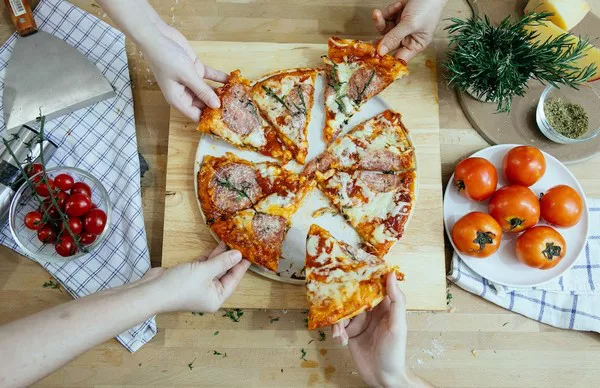Pizza, a beloved dish with Italian origins, has captured the hearts and taste buds of people worldwide. The magic of a well-made pizza lies not only in its flavorful ingredients but also in the process of creating a perfect harmony of flavors, textures, and aromas. In this comprehensive article, we’ll embark on a culinary journey to explore the art of making homemade pizza, from preparing the dough to selecting the finest toppings and achieving that ideal crispy crust. Whether you’re a seasoned home cook or a beginner in the kitchen, this guide will equip you with the knowledge and techniques to create your own culinary masterpiece.
How to Make Pizza

Learn how to make the perfect pizza dough for a deliciously crisp homemade pizza margherita that you can top with whatever you like. Just follow our easy guide.
- oven
- Baking sheet
- Pizza peel or parchment paper
- 2 ¼ teaspoons active dry yeast
- 1 ½ cups warm water
- 3 ½ to 4 cups all-purpose flour
- 2 tablespoon olive oil
- 1 teaspoon salt
- 1 teaspoon sugar
- 1 can crushed tomatoes ((14 oz))
- 2 cloves garlic (minced)
- 1 tablespoon olive oil
- 1 teaspoon dried oregano
- some Salt and pepper to taste
- some Cheese (Mozzarella is a classic choice, but don't hesitate to explore other varieties like Parmesan, fontina, or goat cheese.)
- some Toppings (Get creative with toppings like fresh vegetables, cured meats, herbs, and even fruits. Remember, less is often more to avoid overwhelming the pizza.)
-
Mixing the Dough: Combine flour and salt in a bowl. In a separate bowl, dissolve yeast in warm water and let it sit for a few minutes. Gradually add the yeast mixture to the flour, incorporating it with a fork until a shaggy dough forms. Knead the dough on a lightly floured surface until it's smooth and elastic.
-
Fermentation: Place the dough in a lightly oiled bowl, cover it with a damp cloth, and let it rise in a warm, draft-free area until it doubles in size (usually 1 to 2 hours). This fermentation process develops flavor and texture.
-
Dividing the Dough: Gently deflate the risen dough and divide it into portions. Shape each portion into a smooth ball and cover them with a cloth, allowing them to rest for about 15 minutes. This relaxation phase makes stretching easier.
-
Stretching the Dough: On a floured surface, use your fingertips to gently press and stretch the dough from the center outward. Rotate the dough as you work to achieve an even thickness. Alternatively, use a rolling pin to achieve your desired crust thickness.
-
Preheating the Oven: Place a pizza stone or baking sheet in the oven and preheat it to its highest temperature (usually around 500°F/260°C) for at least 30 minutes. A hot oven ensures a crisp crust.
-
Assembling the Pizza: Transfer the stretched dough to a pizza peel or parchment paper. Spread a thin layer of tomato sauce over the dough, leaving a border for the crust. Sprinkle shredded cheese evenly over the sauce.
-
Adding Toppings: Arrange your desired toppings on the cheese. Remember that less is more—overloading the pizza can lead to a soggy crust.
-
Baking the Pizza: Slide the pizza onto the preheated pizza stone or baking sheet in the oven. Bake until the crust is golden brown and the cheese is melted and bubbly, usually about 8 to 12 minutes.
-
Cooling and Slicing: Allow the pizza to cool slightly before slicing. This prevents the toppings from sliding off and allows the flavors to meld.
-
Garnishing: Once sliced, add fresh herbs, a drizzle of olive oil, or a sprinkle of red pepper flakes to enhance the flavors and visual appeal.
Tips for Pizza Perfection
1. Hot Oven: Preheat your oven to the highest temperature it can go. A hot oven is crucial for achieving a crispy crust.
2. Pizza Stone or Baking Steel: Using a pizza stone or baking steel helps create an evenly heated surface, resulting in a crispier crust.
3. Parchment Paper: Use parchment paper under the dough to make transferring the pizza to the oven easier.
4. Watch the Time: Keep a close eye on your pizza while it’s baking. The cooking time can vary based on your oven and thickness of the crust.
5. Resting Time: Allow the pizza to rest for a couple of minutes before slicing. This allows the cheese to set and makes slicing easier.
6. Experiment with different flour blends for unique textures and flavors.
7. Don’t overload the pizza with toppings—balance is key.
8. Brush the crust with olive oil before baking for a beautiful golden color.
9. Precook watery toppings like mushrooms to prevent a soggy crust.
10. Get creative with sauces, cheeses, and toppings to craft your signature pizza.
Troubleshooting Guide: Overcoming Common Challenges in Pizza Making
1. Problem: Tough or Chewy Dough
Ensure Proper Kneading: Kneading the dough thoroughly helps develop gluten, which gives the dough its structure. Knead until the dough is smooth and elastic.
Allow Adequate Rest: Let the dough rise for the recommended time to allow yeast to do its magic and create a lighter texture.
Stretch, Don’t Roll: When shaping the dough, use your hands to gently stretch it. Avoid using a rolling pin, which can make the crust dense.
2. Problem: Dough Doesn’t Rise
Check Yeast Freshness: Ensure your yeast is fresh and active. Proof it by dissolving it in warm water with a pinch of sugar before adding it to the dough.
Warm Environment: Place the dough in a warm, draft-free area for rising. A slightly warmed oven (turned off) or a sunny spot can help.
3. Problem: Soggy Crust
Preheat Properly: Make sure your oven is fully preheated to a high temperature before baking. A hot oven helps create a crisp crust.
Avoid Overloading: Use a light hand when adding toppings. Excessive moisture from toppings can lead to a soggy crust.
4. Problem: Burnt Toppings, Undercooked Crust
Adjust Oven Rack: If your toppings are burning before the crust is fully cooked, move the oven rack to a lower position.
Reduce Oven Temperature: Consider lowering the oven temperature slightly to achieve a balanced cook between toppings and crust.
5. Problem: Cheese Doesn’t Melt Properly
Grate Cheese Fresh: Grate your cheese just before using it to prevent moisture buildup.
Layer Wisely: Place cheese over sauce and toppings to shield it from direct heat, allowing it to melt evenly.
6. Problem: Unevenly Baked Pizza
Rotate Pizza: Halfway through baking, rotate the pizza to ensure even cooking. This is especially important in ovens with uneven heat distribution.
7. Problem: Sticky Dough
Use Flour Sparingly: While shaping the dough, use only enough flour to prevent sticking. Excessive flour can result in a dry and tough crust.
8. Problem: Sauce Soaks into Dough
Thin Layer: Apply a thin layer of sauce to avoid excess moisture that can make the crust soggy.
Prebake Crust: Prebaking the crust for a few minutes before adding sauce and toppings can create a barrier against moisture.
9. Problem: Cheese Slides Off Toppings
Optimal Cheese Distribution: Distribute cheese evenly over toppings to ensure it acts as a cohesive binder.
10. Problem: Toppings Burn Before Crust is Ready
Partially Cook Toppings: Some toppings may need pre-cooking before adding them to the pizza to ensure they cook evenly with the crust.
11. Problem: Pale or Blonde Crust
Increase Oven Temperature: A higher oven temperature can help achieve a golden-brown crust. Just be mindful of the baking time to avoid burning.
12. Problem: Crust is Too Crispy or Hard
Adjust Oven Temperature: Lower the oven temperature slightly and keep a close eye on the baking process.
Exploring Pizza Toppings
1. Pepperoni: A perennial favorite, pepperoni adds a savory and slightly spicy kick to your pizza. Its crisp edges and rich flavor make it a classic choice.
2. Margherita: Inspired by tradition, the Margherita features fresh basil leaves, sliced tomatoes, and fresh mozzarella cheese, drizzled with olive oil. It’s a celebration of simplicity and balance.
3. Hawaiian: Sweet and savory collide with ham and pineapple, creating a tropical-inspired pizza that’s both comforting and unique.
4. Four Cheese: Indulge in a medley of cheese flavors with a blend of mozzarella, Parmesan, ricotta, and Gouda. The result is a creamy and gooey delight.
5. Meat Lover’s: Satisfy carnivorous cravings with a generous assortment of meats such as sausage, bacon, ham, and ground beef. This hearty option is a feast for meat enthusiasts.
6. Veggie Supreme: Pile on a rainbow of vegetables like bell peppers, red onions, mushrooms, black olives, and spinach for a burst of color and freshness.
7. Mediterranean Delight: Transport your taste buds with roasted red peppers, artichoke hearts, Kalamata olives, feta cheese, and a sprinkle of oregano.
8. Spinach and Feta: The earthy flavor of spinach pairs harmoniously with the tanginess of feta cheese, creating a light and flavorful combination.
9. Roasted Veggie: Elevate your pizza with roasted vegetables like zucchini, eggplant, and cherry tomatoes. Drizzle with balsamic reduction for added depth.
10. BBQ Chicken: Tangy barbecue sauce, grilled chicken, red onions, and a blend of cheeses create a fusion of smoky and savory flavors.
11. Caprese: Embrace the flavors of Italy with sliced tomatoes, fresh mozzarella, basil leaves, and a drizzle of balsamic glaze.
12. Tandoori Chicken: Infuse Indian spices into your pizza with tandoori-marinated chicken, red onions, bell peppers, and a dollop of yogurt sauce.
13. Thai Curry: Transport your taste buds to Thailand with coconut curry sauce, shrimp, bell peppers, onions, and a sprinkle of cilantro.
14. Greek Gyro: Capture the essence of a Greek gyro with seasoned lamb, red onions, tomatoes, cucumbers, and a drizzle of tzatziki sauce.
15. Fig and Prosciutto: Experience a symphony of flavors with sweet figs, salty prosciutto, arugula, and a drizzle of honey.
16. Pesto Pizzazz: Swap traditional tomato sauce for vibrant pesto, and top with sun-dried tomatoes, pine nuts, and goat cheese.
17. Apple and Brie: Indulge in a blend of sweet and savory with thinly sliced apples, creamy Brie cheese, caramelized onions, and walnuts.
See Alao: Is Pizza Suitable for Diabetics: Navigating the Pizza Dilemma
Conclusion
Making pizza is a rewarding journey that combines culinary creativity with precise techniques. From selecting premium ingredients to mastering the art of dough stretching and achieving a perfect bake, each step contributes to the creation of a delightful and unforgettable dish. By following this comprehensive guide and infusing your personal touch, you’ll be well on your way to mastering the art of pizza making—a skill that promises to delight your taste buds and impress family and friends for years to come. So, roll up your sleeves, gather your ingredients, and embark on a culinary adventure that celebrates the timeless and universally cherished delight of homemade pizza.

